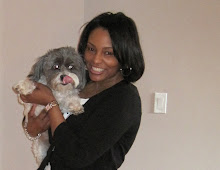Scott often teases me for using "SAT" words all the time. He thinks that I overly complicate language by using "big" words when a small one would do just fine. Just the other day he asked me a question in which he was expecting a yes or no answer but I responded with "absolutely." Of course absolutely is not a big word but I guess it's not one you would expect if someone asked you do you want to go inside and sit with their mom.
People have often commented or took note that my word choices may be different than what they expect. I remember years ago my boss asked me if I was friends with someone outside of work and I responded that while we were not friends per se we have "encountered" each other outside of work. He chuckled and repeated back to me "encountered?"
So what's the deal? Why do I seemingly go out of my way to use complicated words or choose to communicate in this way? Well it's very simple. It's partly because I'm dramatic so would you expect Shakespeare to simply write, "Romeo where the hell are you?" Of course not! Dramatic people use colorful language to get their point across and you remember them or at least what they said because of that.
The other reason has nothing to do with my personality. It's just simply because I like English. Or even more specifically I enjoy linguistics-- language arts. It's always been that way for me. In grade school taking the standardized exams I'd score exceptionally well on the language arts portion and sometime below the mark in science or math. English and Language Arts is my strong suit.
What's interesting is that if you use complex or "big" words people automatically think you are smart. I never understood that logic. Using unusual or non typical words does not mean you are smart. It does suggest, however, that you may be a type A personality. The classic overachiever with a point to prove. --- Otherwise you would not be using those big words now would you?
I always love it when someone uses a word or a phrase that is either old school or overly dramatic. I had professor last summer use the phrase "be that as it may" at least 10 times during the course of one class session. Who says that??? It made such an impression that I started saying it all the time! Just think when someone says "be that as it may" what are they really saying to you? They're saying I could careless about what you just said to me, we're doing it my way @sshole! I'd love nothing more than to be able to respond to someone at work in all seriousness after they've just wasted 10 mins of my time explaining to me what my predecessor used to do.
A few months ago an executive wrote an email to me going completely off because I'd ruled a no when he wanted a yes. He went on for several paragraphs and at the end stated that if I did not relent he would resort to a more draconian method. (This simply meant he would fire then re-hire an employee we were discussing).
Now usually I could careless about someone giving me an ultimatum. But I was so excited and impressed with his choice and use of draconian, I totally gave in!! I mean seriously, who uses the word draconian in every day language? I didn't need to know anything else about him other than the word choices he used to determine that he is type A, neurotic and worth being a little afraid of. After all, I did not want to him to resort to draconian measures with me either.
I love words so much that I bought a book, "Why You Say That" by Webb Garrison, so that I could further understand the origin of certain words and phrases. Who knew that the phrase "handwriting on the wall" came from biblical times when Daniel was the only person who could interpret the writings of the Babylonians? I bet you didn't know that a 'bigwig" used to distinguish a judge from all others in a court room. Waking up "on the wrong side of the bed" can be attributed to 18th century culture being so fixated on right handedness that anything "left" of that is considered sinister or wicked. So they attributed weird or out of the ordinary behavior as waking up on the wrong side of the bed. To avoid undesirable behavior they went so far as to push the bed up against a wall to ensure you get out on the "right" side. Who knew these random things? Some may think it's useless information but for me it helps me frame the intent of the word or phrase.
The bible is a great source for quotes and sayings that have become a part of everyday language. Doubting Thomas, working like a Hebrew slave, sell you down the river. Even non-Christians or people who do not believe in God use phrasing that comes directly from the bible. I wonder if they'd continue to use these phrases if they knew where it came from?
So you now understand how great language is and why I choose certain unusual words when a plain one would do just fine. I wonder if my next career should be in speech writing for McCaint? Hmm...
Hello
12 years ago

1 comment:
I concur. You have always been like this!
Post a Comment